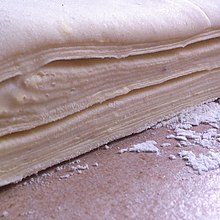Laminated dough is a culinary preparation consisting of many thin layers of dough separated by butter or other solid fat, produced by repeated folding and rolling. Such doughs may contain more than eighty layers.[1] During baking, water in the butter vaporizes and expands, causing the dough to puff up and separate, while the lipids in the butter essentially fry the dough, resulting in a light, flaky product.[2]

Pastries using laminated doughs include:
- Croissant pastry, from France
- Danish pastry, made with yeast-leavened dough, from Austria via Denmark
- Flaky pastry
- Jachnun, a Yemenite Jewish pastry
- Kouign-amann, a sweet Breton cake from north-western France
- Kubaneh, a traditional Yemenite Jewish bread[3]
- Malawach, a Yemenite Jewish flatbread
- Paratha, a flatbread native to South Asia
- M'semen, a traditional flatbread of northern Africa
- Puff pastry
See also
edit- Food portal
- Dough sheeting, an industrial preparation technique
- Filo pastry, used in applications such as baklava, strudel, and spanakopita, where the dough itself is not laminated
- Kâhi, an Iraqi dough can be mixed with cream and sugar syrup
References
edit- ^ King, Andy; King, Jackie. "Laminated Dough: A Guest Post from Bakery Owner Andy King". King Arthur Flour. Retrieved 1 November 2014.
- ^ Alton Brown (March 21, 2011). "A Bird In The Pie Is Worth Two In The Bush". Good Eats. Season 14. Episode 1416. 12 minutes in. Food Network.
- ^ Rao, Tejal (22 June 2017). "Before Croissants, There Was Kubaneh, a Jewish Yemeni Delight". New York Times Magazine. Retrieved 3 July 2017.